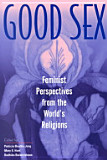Though the material for this project was introduced primarily through Summer Academy and assigned readings, we must return to GLBT Week 2006 as the beginning place of a shift that has taken place in my thought. I am not sure that I had ever heard the term "heterosexism" before Mary Hunt introduced it in her lecture entitled "Feminist Theo-ethics: queering imagination and action." But as I made preparations for the new LTS Allies website and digitized the available lectures given at previous GLBT Week celebrations, I found "heterosexism" to be a term that had also emerged in the language of Christine Smith and Virginia Ramey Mollenkott in preceding years. Patricia Beattie Jung and Ralph F. Smith define heterosexism as "a reasoned system of bias regarding sexual orientation which denotes prejudice in favor (privilege) of heterosexual people and prejudice against bisexual and particularly homosexual people" in matters of law, economics, politics, custom, ethics, religious life and commerce (13, 14). These authors are very careful to distinguish between homophobia – an unreasoned and irrational fear/hatred of homosexuals – and heterosexism, which implies no fear at all, but instead the privilege afforded to perceived heterosexuals over their queer neighbors. Within the discourse of the LTS community we have made a point of strongly urging people to speak of heterosexism rather than homophobia. [Instructor Comment: I hope many hear this message!]
Tag: Mary Hunt
Reflections on Good Sex
The essays in the compilation Good Sex: Feminist Perspectives from the World’s Religions include the views of several Jewish and Christian feminist scholars. Though not all of the authors identify as lesbian, they share similar views and concerns. It is interesting to note that in many ways their unity is found more in their shared gender identity than in their sexual preferences. This is the first feature of these essays that I found striking: there is no analogous "masculist" movement nor a shared set of concerns among gay and straight men that would provide an overarching backdrop in a male-oriented conversation. However, as I reflect on this a possible explanation appears to be that women, whether gay or straight, are able to identify with each other’s oppression within our framework of power dynamics. Straight men, who most often occupy the position of privilege in our society, are less apt to identify with the oppression faced by gay men, as to do so could result in a loss of privilege.
